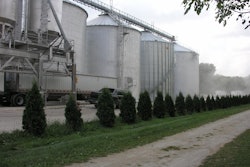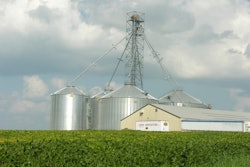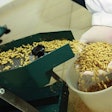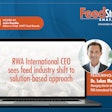“Shape the Future. Feed the World.” It’s the motto and guiding principle behind the Institute for Feed Education and Research (IFEEDER). IFEEDER has many goals, but its main purpose is to provide knowledge relating to the nutrition of animals and sustainable feed manufacturing practices and through education and research.
IFEEDER sees a critical need to support the research and education projects necessary to provide answers to the question of how to provide safe, affordable food and feed to sustain a growing world population. The IFEEDER board of trustees only approves projects that are directly relevant to finding answers to these questions.
“You talk about sustainability, the role of animal agriculture, food supply and the safety of the food supply — these are the focus areas of IFEEDER,” Alan Gunderson, chair of the IFEEDER board of trustees and vice president, Vita Plus Corporation explains.
Since IFEEDER was launched in January 2010, it has awarded several students scholarships and has given a $75,000 grant to the National Research Council, which has authorized a new Swine Nutrition Committee that is updating the 1998 Nutrient Requirements of Swine.
The board of trustees recently held its annual meeting and tentatively approved two new research initiatives. One dealing with the Nutrient Requirements of Beef and the other pertains to Salmonella in feed.
Through support from companies and individuals within the feed industry, IFEEDER is poised to accomplish great things in the years ahead.
Feeding the world
In 2009, the world’s population was 6.7 billion people. According to the American Feed Industry Association (AFIA), by 2050, the world’s population is estimated to be 9.1 billion. This increase in population will result in an enormous increase in the world demand for food. Food production must double by 2050.
“Today the average U.S. farmer feeds 144 people,” says Richard Sellers, corporate secretary of IFEEDER and vice president of feed regulation and nutrition at AFIA. “In 1940, that number was only 19 people. We’ve made great progress but we have a long way to go. Today, one acre feeds 1.6 people. By 2050, one acre must feed four people. To feed the world in 2050, investment in agriculture must reach $83 billion per year. This equals a 50 percent increase in investment from current levels. The U.S. feed industry is a very critical part of this chain.”
Only through today’s education and scientific-based research will our future generations be able to support the increased world food demand.
AFIA’s leaders’ and members’ commitment to finding ways to feed the world’s future population led way to the formation of IFEEDER.
The birth of an institute
“If you go back to the inception of IFEEDER, it came about because AFIA leaders looked at their activities and knew they wanted to focus on the legislative and regulatory angle,” Gunderson says. “But they didn’t want to leave research and education behind, so they decided to address those topics through a charitable foundation.”
Gunderson says after a year-long series of meetings and discussions, an AFIA task force created IFEEDER, an idea that was a long overdue in the feed industry. The institute was founded in 2009, but it received its 501c3 designation from the IRS in early 2010, which is when it was officially introduced to the public at the International Feed Expo in Atlanta.
From its beginning, IFEEDER set out to address these specific challenges:
- a lack of public sector funding for key basic science and economic impact studies;
- the shortage of technical and professional employees that see the feed industry as a viable career option;
- resource limitations/restrictions (i.e. energy, water);
- consumer perceptions of food animal production;
- regulatory and legislative policies from federal, state, and local governments; and
- a lack of support and funding for sustainable feed manufacturing practices.
IFEEDER’s first grant was for $75,000, to the National Research Council which has authorized a new Swine Nutrition Committee. The committee is updating the 1998 Nutrient Requirements of Swine. Updating this work is essential to moving the feed industry toward a more efficient swine industry. In addition, this grant to NRC helped leverage an additional $225,000 in grants from other organizations, which will be paid out over a two-year period.
“We’re glad to have accomplished what we have in the past year, but there is more focus areas that we want to look at,” says Gunderson. “IFEEDER is a foundation that looks for opportunities to support and fund initiatives in education and research in a number of critical areas.”
Addressing some of those other critical areas, the IFEEDER board of trustees tentatively approved the funding of new research initiatives at its annual meeting at the 2011 International Feed Expo in Atlanta.
Future research
IFEEDER will likely continue to fund the NRC studies, including a new Nutrient Requirements of Beef publication.
“The NRC for beef is very similar to what we did for swine,” says Gunderson “The NRC pulls together the existing research necessary to publish the nutrient requirements for beef nutritionists to use as a benchmark for putting together their feeding programs.”
Another tentatively approved project will provide more information on the acceptable levels of Salmonella in feed.
“We’re all aware that new regulations are in place,” says Gunderson. “But there is still a real need for defining different Salmonella serotypes, as well as an explanation of which are problematic and at what level it may become a problem. This is critically important to the feed industry, but without a coalition to leverage the governmental funds to get those answers, it won’t happen.”
So, IFEEDER has given its tentative approval to funding a new coalition AFIA created called the Salmonella in Feed Research Coalition. The goal of this group is to provide the USDA the funding to perform some feed-related Salmonella research with about 10 other groups, thereby raising $100,000 for research.
In addition to those projects, Sellers notes, “AFIA is preparing a roadmap for sustainability of the feed industry in the broad sense, meaning what can be done to sustain the feed industry long term. We expect AFIA will come to IFEEDER for funding this roadmap.”
In the future, the board of trustees hope to fund research in several other areas that will help guide food and feed regulations for the next generation.
“Under secretary for food safety Elisabeth A. Hagen said the legislation and regulations in food safety were going to be governed by common sense and sound science,” recalls Gunderson. “I couldn’t agree more because if we’re going feed the world going into the rest of this century and the next, we have to research what truly is the most efficient and sustainable way for us to produce the food that we need.”
For example, IFEEDER is interested in funding economic studies to estimate the ban on low-level antibiotics on both income to the industry, as well as the larger issue of loss of production and income to the animal producer community.
Another example of potential research IFEEDER may fund is defining the carbon footprint of commercial animal feed production to determine the sustainability index. Consumers and customers wish to know this information, and IFEEDER would fund education and outreach about the results.
As a charitable organization, IFEEDER relies on donations from the industry to continue its mission. To date, IFEEDER has received donations or pledges from 24 companies and 17 individuals totaling more than $525,000. The board of trustees has set a goal to raise $2 million by the end of 2013.
Learn more about IFEEDER at www.ifeeder.org.


















